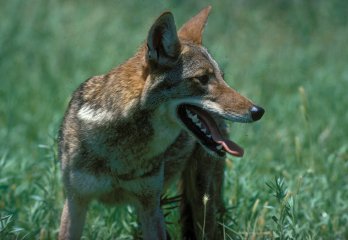Urban Coyotes

- The Texas Parks and Wildlife Department provides expertise and advice on urban wildlife issues, but does not implement nuisance coyote control.
- Texas Wildlife Services, in partnership with local governments, does provide nuisance coyote control services in some urban areas. In some cities, such as Austin, Texas Cooperative Extension assists with coordinating nuisance coyote control and public education. Call the main Texas Wildlife Services office in San Antonio at (210) 472-5451 to get the number of the local office nearest you.
- Urban and suburban coyotes, like urban deer, are symptoms of a broader issue. People continue to expand housing subdivisions and other human development into what used to be open range wildlife habitat, especially on the expanding fringes of large metropolitan areas. This is increasing the potential for encounters and conflicts between people and wildlife.
- Trapping and similar nuisance control actions cannot eliminate urban coyote problems, although this can be part of the solution in some situations.
- The real solution and the greater need facing Texans right now is public education. We need to inform and empower people to take steps to coexist with coyotes and other urban wildlife.
- There are some common sense precautions people can take to manage coyotes:
- Do not feed coyotes! Keep pet food and water inside. Keep garbage securely stored, especially if it has to be put on the curb for collection; use tight-locking or bungee-cord-wrapped trashcans that are not easily opened.
- Keep compost piles securely covered; correct composting never includes animal matter like bones or fat, which can draw coyotes even more quickly that decomposing vegetable matter.
- Keep pets inside, confined securely in a kennel or covered exercise yard, or within the close presence of an adult.
- Walk pets on a leash and accompany them outside, especially at night.
- Do not feed wildlife on the ground; keep wild bird seed in feeders designed for birds elevated or hanging above ground, and clean up spilled seed from the ground; coyotes can either be drawn directly to the seed, or to the rodents drawn to the seed.
- Keep fruit trees fenced or pick up fruit that falls to the ground.
- Do not feed feral cats (domestics gone wild); this can encourage coyotes to prey on cats, as well as feed on cat food left out for them.
- Minimize clusters of shrubs, trees and other cover and food plants near buildings and children's play areas to avoid attracting rodents and small mammals that will in turn attract coyotes
- Use noise making and other scaring devices when coyotes are seen. Check with local authorities regarding noise and firearms ordinances. Portable air horns, motor vehicle horns, propane cannons, starter pistols, low-powered pellet guns, slingshots, and thrown rocks can be effective.